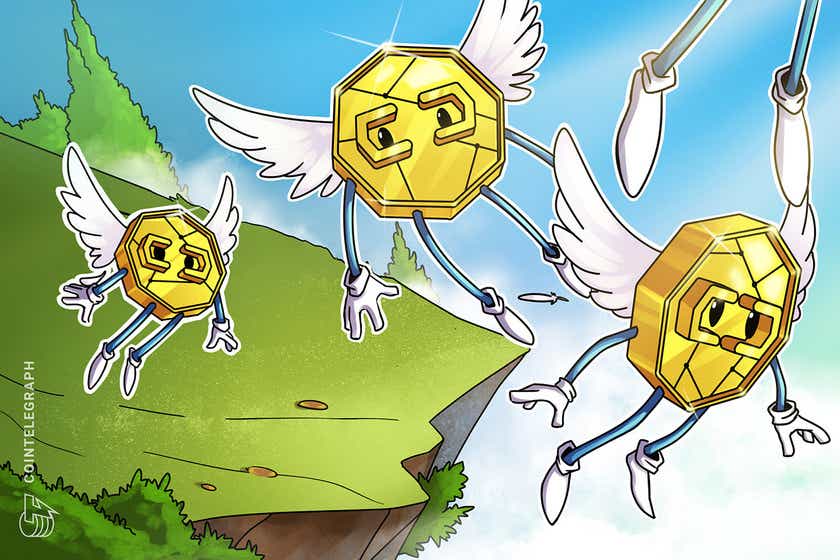BSN ‘Split’ Can Stimulate China’s Blockchain Sector Toward Global Reach
Launched in April 2020, China’s Blockchain Service Network was designed to serve as a hosting platform for small and medium-sized businesses as well as independent entrepreneurs alike. The network seeks to provide developers with a wide array of tools to devise various novel blockchain applications, thus enabling the creation of a standardized blockchain ecosystem across various public networks, regions and business sectors.
However, less than three months after deployment, the BSN has split into two separate entities — BSN-Chain and BSN-International — reportedly after disagreements arose around the network’s members deciding to integrate public blockchains into its existing framework.
The BSN-International chain, which is the new offshoot, will be headed by one of the original members of BSN, a private firm called Red Date Tech, and will not be able to execute any operational strategies of its own accord without the prior approval of BSN-Chain. Providing his thoughts on the matter, Yifan He, the founder and CEO of Red Date Tech, told Cointelegraph that the network remains a single entity with the latest decision being a step forward:
“In China, there is a clear regulatory restriction on the deployment of public permissionless blockchain networks. Since the BSN is meant to be a global interoperability network, it must comply with these rules in China but also be flexible enough to accommodate other blockchain ecosystems such as public chains internationally.”
As previously reported, a source closely associated with the situation told Cointelegraph that the pushback emanated from BSN’s core, state-owned members — namely China Mobile Communication Corporation and China Union Pay — being opposed to the idea of public chains becoming a part of the network.
Getting to the bottom of the matter
To gain a better understanding of what happened, Jay Hao, the CEO of OKEx — a cryptocurrency exchange that has one of its main operation centers in Hong Kong — told Cointelegraph that it is a well-known fact that many Chinese officials are not in favor of integrating or using public blockchains in any shape or form since they cannot be easily controlled:
“That said, even without blockchain technology, every government, including China, already has a very high level of control over how its citizens spend their money. They can already easily trace the majority of money flow simply by demanding that banks disclose their clients’ transactions. China is already a practically cashless society.”
Hao further pointed out that China currently houses many large and capable private technology companies that have been developing their very own blockchain products. Thus, if there have been disagreements about the integration of public blockchains, then the two entities — BSN-Chain and BSN-International — will still have to comply with local laws and regulations. Furthermore, he doesn’t see the split as being a setback, rather, it will likely create greater competition and even increase the speed with which the country’s blockchain ecosystem advances.
However, Red Day Tech’s Yifan He was adamant that there is no split whatsoever nor was there any disagreement among the founders of BSN. In his view, the reports that have been coming out are inaccurate and need to be revised, stating: “It does not make sense to talk about splitting the BSN network into two; it is still just a unified global interoperability network connecting various blockchain ecosystems together.” Yifan added:
“The solution is to have an independent governing body formed to shepherd the development of the BSN internationally. This international governance should be completely separated from the China governance of BSN on the mainland as the requirements and focus is completely different and will operate in jurisdictions with different rules.”
Is it a split or not a split?
While speculation surrounding if and how the BSN has split and if that change will affect China’s blockchain ecosystem, Cointelegraph reached out to Kevin Wang, a co-founder of Nervos — one of the first six public blockchain projects integrating with BSN. In his view, as a part of the first batch of private players joining the BSN ecosystem, his company is hoping to become accessible with China’s domestic, as well as international, city nodes:
“We still see BSN’s split as an expansion of the network and a significant step forward for China’s blockchain ecosystem. BSN’s new international portal signals that the Chinese blockchain community sees value in permissionless blockchain technology — even if the initial integrations are limited in scope.”
Additionally, from a developer’s perspective, the split still provides users with access to a more robust blockchain network than previously available. Users outside of China will be able to tap into public chains like Nervos via the BSN-International Portal, while local users — i.e., Chinese residents — won’t have direct access to public networks; instead, they will be provided with a certain level of interoperability between public networks and permissioned chains.
Furthermore, BSN’s two-pronged approach also brings unified tooling and programming interfaces to accelerate developer adoption both within China as well as globally. In this regard, projects like Nervos have been working toward unifying permissioned and permissionless blockchains to cater to BSN users operating within different regulatory frameworks.
However, Yifan disagrees with the assessment that BSN has “split into two entities,” clarifying that there is still just one global BSN network that will continue to span across the world and the Chinese mainland. He further stated:
“Each country has laws and regulations to govern the deployment and use of the internet, notably including privacy, security and data localization rules. Once the BSN goes global, it is required to be compliant with these same types of policies. In each country or region, all BSN operations will need to comply with local laws and regulations.”
How will the new setup work?
According to Wang, BSN offers three main operational models: permissioned services, permissionless services and interchain services. The permissioned services already run via the BSN China Portal, while the permissionless ones will run through the BSN-International Portal. He further told Cointelegraph that his team has been working closely with BSN to integrate Nervos’ native blockchain into the BSN ecosystem: “The plan is to continually collaborate with BSN, as they help further reduce the cost of DApp development, which is huge for the developer community.”
Similarly, he pointed out that developers will have the ability to use one of two portals based on their circumstances. For example, Chinese developers who want to access permissioned networks can use the BSN-Chain Portal, while global developers tasked with building platforms for international players can tap into public blockchains like Nervos through the BSN-International Portal.
Elucidating his views on the matter, Yifan highlighted that it is important to note that while the governance aspect of the project has been decoupled, BSN will have complete interoperability between mainland China and international sides. Not only that, but he also stated that it was decided unanimously by the BSN founding partners and the BSNDA governing board that the best solution moving forward was for Red Date Tech to manage the deployment strategy, as well as setting up the future governance frameworks for the international BSN expansion. Yifan told Cointelegraph:
“BSN founding members have unanimously decided to give Red Date a clear written mandate to be solely responsible for the international development and governance of the BSN going forward. In the future, we expect there may be more governing bodies for the BSN to be added in order to fit the bespoke needs of different regions and countries as well as for contributing to the overall BSN strategy in order to get truly global participation.”
Will China’s optimism toward blockchain by BSN news?
Back in October 2019, Chinese President Xi Jinping called for members of his country’s tech sector to accelerate their adoption of blockchain technology — especially as a core for China’s future innovation efforts. However, following these latest developments, it is worth asking the question: Will the latest move by BNS result in China’s technology sector losing its confidence in blockchain tech?
Hao told Cointelegraph that China’s optimism regarding blockchain technology stems not only from President Xi’s endorsement of the technology but also from the fact that a number of local knowledgeable experts have helped shape the public’s mindset regarding the technology, making them very crypto and blockchain literate, adding: “China is one of the most developed markets in terms of cryptocurrency and blockchain.” He went on to say: “However, there will always be differences of opinion in any country about how to best implement emerging technologies, and China is no different.”
Also, to understand China’s blockchain ambitions, one needs to understand the mammoth scope and potential of the BSN project. The network has been designed to bring blockchain apps together where both permissoned and permissionless applications can be built, managed and scaled. Furthermore, Marie Tatibouet, the chief marketing officer of Gate.io — a Singapore-based cryptocurrency exchange — pointed out that owing to the fact that many of China’s existing policies do not directly support permissionless nodes in an environment such as the one used by BSN, various states felt that they needed to establish two separate networks that can be supervised separately to avoid a potential conflict of interest.
What’s more, such developments in no way seem to suggest that China’s blockchain momentum is waning; if anything, it signals an evolution in how governments may be looking to integrate advanced technologies into their existing infrastructures in ways that are not only holistic but advantageous for all of the involved parties.
What about China’s CBDC plans?
So, will BSN’s decision hamper China’s plans of releasing its very own central bank digital currency? Eden Dhaliwal, the global managing director of the Conflux Network, believes that the biggest issue surrounding China’s blockchain ecosystem stems from the fact that a number of projects launched out of China in the past were conducted through noncompliant initial coin offerings or token sales that resulted in many people getting scammed. However, he is confident that the BSN project’s latest happenings will not affect China’s upcoming CBDC plans in any way.
A similar sentiment is shared by Wang, who believes that the Chinese regime is serious about introducing its very own CBDC, as is highlighted by the fact that the government has been looking into the technology for more than six years already: “I do not believe that this latest development will hamper any blockchain initiatives in the country or its plans of launching its CBDC.”
Does the future look promising?
From the perspective of private players becoming a part of China’s BSN, one can see that it provides such entities with an ideal opportunity to expand the use cases for their native public chain and layered architectures. However, Wang is of the opinion that it’s about time public and private players start to embrace the benefits of permissioned and permissionless systems, adding:
“We’ve formed relationships in the enterprise blockchain space and partnerships with major exchanges like Huobi to form Huobi Chain — a regulator-friendly public DeFi blockchain. All of these developments, including the integration with BSN, are important milestones in our roadmap and establishing our place as a core player in the larger blockchain ecosystem.”
Lastly, it’s worth noting that the addition of multiple public chains to China’s blockchain ecosystem will allow them to benefit from what BSN seeks to offer — like security, interoperability, flexibility and reduced cost. Additionally, the recent “split” could ensure a more secure and controlled environment for state-owned blockchains, something that seems to be high on the Chinese government’s agenda at the moment.









